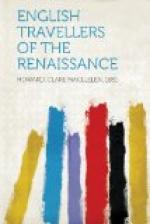The mother of Francis Bacon affords a good example of the Puritan distrust of going “beyond seas.” She could by no means sympathize with her son Anthony’s determination to become versed in foreign affairs, for that led him into intimacy with Roman Catholics. All through his prolonged stay abroad she chafed and fretted, while Anthony perversely remained in France, gaining that acquaintance with valuable correspondents, spies, and intelligencers which later made him one of the greatest authorities in England on continental politics. He had a confidential servant, a Catholic named Lawson, whom he sent over to deliver some important secret news to Lord Burghley. Lady Bacon, in her fear lest Lawson’s company should pervert her son’s religion and morals, had the man arrested and detained in England. His anxious master sent another man to plead with his mother for Lawson’s release; but in vain. The letter of this messenger to Anthony will serve to show the vehemence of anti-Catholic feelings in a British matron in 1589.
“Upon my arrival at Godombery my Lady used me courteously until such time I began to move her for Mr Lawson; and, to say the truth, for yourself; being so much transported with your abode there that she let not to say that you are a traitor to God and your country; you have undone her; you seek her death; and when you have that you seek for, you shall have but a hundred pounds more than you have now.
“She is resolved to procure Her Majesty’s letter to force you to return; and when that should be, if Her Majesty give you your right or desert, she should clap you up in prison. She cannot abide to hear of you, as she saith, nor of the other especially, and told me plainly she should be the worse this month for my coming without you, and axed me why you could not have come from thence as well as myself.
“She saith you are hated of all the chiefest on that side and cursed of God in all your actions, since Mr Lawson’s being with you....
“When you have received your provision, make your repair home again, lest you be a means to shorten her days, for she told me the grief of mind received daily by your stay will be her end; also saith her jewels be spent for you, and that she borrowed the last money of seven several persons.
“Thus much I must confess unto you for a conclusion, that I have never seen nor never shall see a wise Lady, an honourable woman, a mother, more perplexed for her son’s absence than I have seen that honourable dame for yours."[155]
It was not only a general hatred of Roman Catholics which made staunch Protestants anxious to detain their sons from foreign travel towards the end of Elizabeth’s reign, but a very lively and well-grounded fear of the Inquisition and the Jesuits. When England was at war with Spain, any Englishman caught on Spanish territory was a lawful prisoner for ransom; and since Spanish territory meant Sicily, Naples, and Milan,




